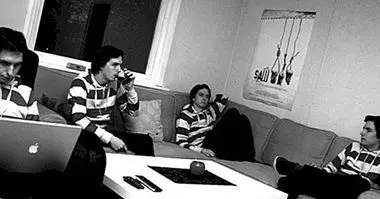Tourette syndrome: causes, symptoms, diagnosis and treatment
The Tourette syndrome is a neurological disorder that causes the affected movements and sounds involuntarily and without a specific purpose .
These movements are repeated intermittently and usually increase in situations of stress. It is usually considered a particularly severe and chronic form of multiple tics.
What is Tourette Syndrome?
Symptoms that appear in the early stages of the development of Tourette syndrome begin between eight and eleven years of age, the intensity of which is highly variable. The affected person may suffer periods of frequent and frequent tics, and others in which the presence of these becomes practically non-existent. Children are three to four times more likely to have Tourette's syndrome than girls (1).
The tics can be classified as simple or complex tics :
- Simple tics : these are brief, involuntary and unforeseen movements that affect a specific and limited number of muscle groups. Although they occur in isolation, they are repetitive. Examples of this type of affectation are: moving the head, blinking, shrugging the shoulders, breathing hard through the nose ...
- Complex tics: Coordinated and cyclical movements that affect several muscle groups, such as kicking, jumping, sniffing objects or people, coprolalia (emission of bad and obscene words in an uncontrolled way), etc. That is, they require a more complex and abstract type of mental processing.
Causes
The causes of Tourette syndrome they are still unknown and there is no scientific consensus on this. Some hypotheses suggest that its origin may be linked to affectations in some brain regions and alterations in the chemical substances (dopamine, norepinephrine and serotonin) that provide interneuronal communication.
It has been scientifically proven that Tourette's syndrome is a hereditary disease and that an affected person has a 50% chance of transmitting the syndrome to their child. All in all, the fact that the genetic predisposition is inherited does not mean that the child will suffer all the symptoms associated with the disorder. Usually, it has been observed that the children of people with Tourette syndrome may present some minor tics, some obsessive-compulsive behaviors, symptoms associated with attention deficit (without the presence of tics), or even a total absence of symptoms .
symptom
Tourette's syndrome it appears during some time of the first two decades of life, and in the same family nucleus there can be a great variability in the presence of associated symptoms . Usually, the first expression of the syndrome is usually a facial tic, and it is common for each affected person to have their own limited repertoire of tics, always repeating them.
Over time, people with Tourette's syndrome show more motor tics of variable nature. They include both the blinking or twitching of the facial muscles, the emission of guttural sounds, the sudden aspiration of air, the kicking, jerking of the neck and head, and so on.
Patients also express annoying sensations in some parts of the body, such as itching, pressure, tingling, itching ... These types of tics are called sensitive tics .
Verbal-type tics are less common than popularly believed. Only 10% of patients present echolalia (repeat what you hear) or coprolalia (involuntary emission of bad words or phrases). Some patients also express tics such as spitting and / or copromimia (offensive gestures).
The recurrence and intensity of tics may get worse or improve throughout the day, and may vary over time. The pathology tends to improve during and after adolescence, in which the worst stage of Tourette syndrome is experienced, often relating to behavioral disorders. In this way, the frequency of important tics and coprolalia (if there is one), is usually reduced when passing from adolescence to adulthood.
How are people affected by this syndrome?
People affected by Tourette syndrome present normal intelligence , although they may have added difficulties for learning during childhood and adolescence, as a consequence of tics and associated behavioral and social pathologies. These pathologies are usually obsessive-compulsive disorder or attention deficit hyperactivity disorder (ADHD). It is also common for them to present behavioral disorders (social isolation, impulsivity, aggressiveness) and sleep.
Problems of impulsivity often lead to depression and anxiety, but these are not part of the neurobiology of the syndrome itself, but are part of the consequences of their way of interacting with the environment and with others.
Sometimes, patients can achieve inhibit tics over a period of time, but eventually they reappear more accentuated, as if it were a way to compensate inhibition. Thus, it seems desirable that people in the patient's environment are sympathetic and behave naturally in the presence of tics.
Some patients have very mild symptoms, which do not require any treatment, and it is even common for their symptoms to disappear over time.
Treatment
No specific treatment is required for tics, except in cases of extreme severity or that have repercussions on muscle pain or disorders in school and social adjustment. In these types of cases, they tend to be straightr neuroleptic drugs in order to reduce the intensity and frequency of tics ., although always under medical supervision and under your supervision.
With regard to psychological therapy, it is effective to treat disorders related to Tourette syndrome, such as stress, depression or anxiety, learning and behavioral problems, and the social and affective consequences caused by the syndrome.
If the syndrome is accompanied by obsessive-compulsive disorder or ADHD, it will be advisable, apart from the therapies already explained, to treat these alterations that can negatively affect the quality of life of the person.
Three real cases
How does it feel to live with Tourette syndrome? Several people with a notorious professional career bring us closer to this neurological syndrome.
1. Mahmoud Abdul-Rauf, an NBA player
Can Tourette suffer and be successful in life? The case of Mahmoud Abdul-Rauf (whose birth name was Chris Jackson) is paradigmatic. We invite you to know his life in this article of the Spanish newspaper Information.
2. Super Taldo: a Chilean child with tics and coprolalia
An extreme case of Tourette Syndrome is the one that suffered Agustin Arenas , nicknamed "Súper Taldo", a Chilean boy who became well known thanks to a news report from Chilean television. You can know his story by entering this link.
Lastly: an in-depth documentary on this condition
A documentary made by the Xplora channel discovered the case of a 20-year-old boy who was diagnosed at the age of eight. In this brief excerpt from the report, the affected person tells us what it is like to live one day with the constant tics. We offer it to you next.
Bibliographic references:
- Cavanna, Andrea. (2010). The Tourette Syndrome. Editorial Alliance.
- Moe, Barbara. (2000). Coping with Tourette Syndrome and tic disorders. New York: Rosen Pub. Group.
- (1) //espanol.ninds.nih.gov/trastornos/tourette_industry.htm



















